Review: Shazam ID
Score:
70%
Ewan, Mr AAS music himself, and with the discography of every major artist in his head, reviews Shazam, a music identification utility...
Version Reviewed: 1.90
Buy Link | Download / Information Link
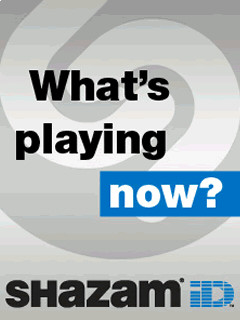 Ever in the situation when you hear a piece of music and wonder what it was? Then Shazam's new application, Shazam ID, is just what you need. Hold it close to your radio speaker and let it listen for ten seconds or so, and it'll come back with not only with the song, but the artist, album, and the option to purchase the track - or an associated ringtone. It sounds almost magical (which it is) and unless you're Paul Gambacinni, it's going to answer a lot of questions when not knowing a piece of music is driving you mad. Or is that just me?
Ever in the situation when you hear a piece of music and wonder what it was? Then Shazam's new application, Shazam ID, is just what you need. Hold it close to your radio speaker and let it listen for ten seconds or so, and it'll come back with not only with the song, but the artist, album, and the option to purchase the track - or an associated ringtone. It sounds almost magical (which it is) and unless you're Paul Gambacinni, it's going to answer a lot of questions when not knowing a piece of music is driving you mad. Or is that just me?
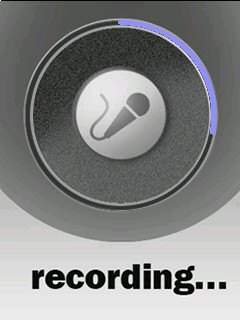 Shazam is one of a number of music discovery services that are available - some that plug directly into your music player (Last.FM), some that are based on your phone (MyStrands) and Shazam, whose hook is that it doesn't hook into anything, but relies on you 'tagging' your music by listening to a track and having their server ID it.
Shazam is one of a number of music discovery services that are available - some that plug directly into your music player (Last.FM), some that are based on your phone (MyStrands) and Shazam, whose hook is that it doesn't hook into anything, but relies on you 'tagging' your music by listening to a track and having their server ID it.
The Shazam ID application itself is an offshoot of the Shazam dial up service, where you could call a number and have Shazam text back the music result to your handset. Based on a subscription model, after the 30 day free trial is over, the service costs £2 a month - the same cost as the subscription to the dial-in line mentioned above.
Okay, service details over, what matters is just how good Shazam ID is at identifying music. I've got a rather wide range of music at home, so I decided that to test Shazam ID, I would try and make it throw up an error. First up though, some confidence checks with recent UK pop music. Shazam ID uses the built in microphone on your phone, so all you need to do is press the 'Tag Now' button and the recording screen (left) will pop up. Hold your phone next to a speaker, and Shazam ID will listen to this and do the magic.
As expected, the music of Steps wasn't a problem, and "Better Best Forgotten" was recognised. Okay, let's try with some songs from Eurovision. The Pirates of the Sea weren't a problem - ID matched, as were Finnish rockers Lordi with "Hard Rock Hallelujah". For fun, I ran through Lordi's "Shotgun Divorce" as well, from their second Finnish album. No problems there. Okay, how about Turkey's entry this year.
And I finally caught out Shazam ID. "Parti", by Mor Van Ostei, comes out as "Her Mevsim Icimden Gelir Gecersin" by Ergin Kizilay. At this point it's fair to point out that Shazam ID is currently UK only, so throwing them the lead track from a Turkish guitar rock band, who don't sing in English, was a bit unfair. Trying smaller bands who do sing in English (such as New Zealand's Deja Voodoo) and Shazam ID faithfully reports back "I've no idea what that is!" I'll forgive that, as I'll also forgive the misnaming of "The Dambusters March" given that it was performed by The Ukulele Orchestra of Great Britain.
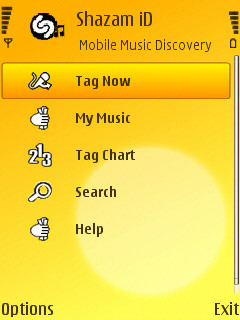
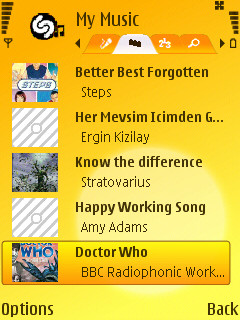
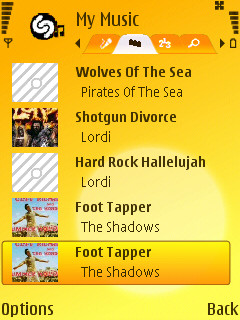
Given the target market of the application, and that for any tune to be in the database it needs to have been indexed (to create a computerised 'fingerprint' that the client will compare your sample of music to), the above failures are understandable, and I think that for the majority of use cases, the music ID system will be very acceptable in terms of accuracy. I can see it solving a lot of arguments.
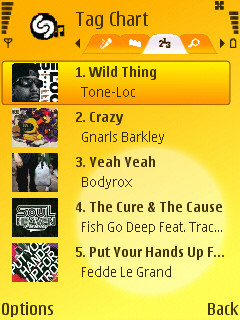
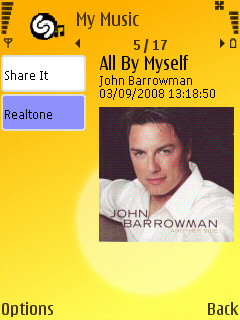
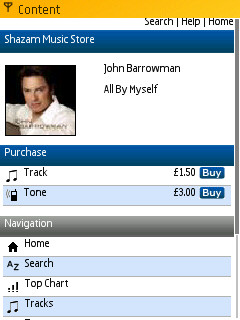
Whether you'll be wanting to keep the service after the 30 day trial is a tough one - it doesn't cost a huge amount per month, and it's useful to have around. Couple the recognition technology with the options to buy the music, either as a full track or as a ringtone (assuming that Shazam can find the track in a store they have an affiliation with), Shazam is a useful tool to know about, although you might want to wait until you really need it before starting the trial.
-- Ewan Spence, Sept 08
Reviewed by Ewan Spence at
